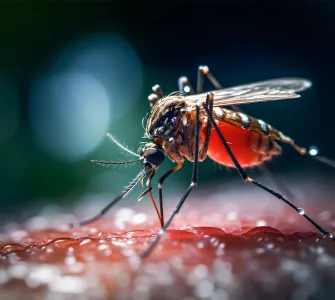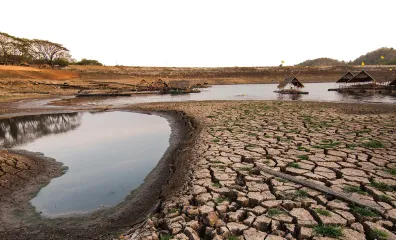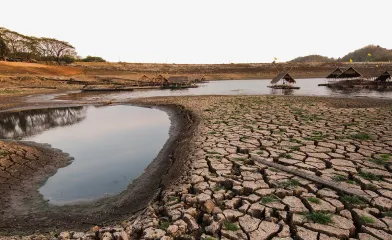Navigating Dengue: A Traveler's Guide


As you prepare for your next adventure, it's crucial to be armed with more than just travel essentials. In recent years, dengue, a mosquito-borne disease, has been on the rise globally, making it essential for travelers to stay informed and take preventive measures.1 Though most dengue infections are mild and asymptomatic, severe dengue (which occurs in 5% of the people who get sick with dengue symptoms) is a medical emergency that could potentially (though rarely) be life-threatening if untreated.1,2
Assessing destination risks
It is important to know if dengue has spread to your destination, so you can help keep yourself and your loved ones safe. Warm and humid climates create ideal conditions for mosquitoes that carry the dengue virus.3,4 The changing climate is also affecting the spread of dengue. Rising temperatures, increased rainfall, and higher humidity levels contribute to the proliferation of mosquitoes, making it important for travelers to be aware of climate-related risks.5-8 While dengue is now present in over 129 countries across the world, it is especially prevalent in parts of The Americas, South-East Asia and The Western Pacific.1,9 Dengue mosquitoes can be present in both rural and urban areas, both indoors and outdoors.10-12 The time of day at which a person is outdoors, and the duration of their stay are also factors that can contribute to the their overall risk.12,13
Understanding dengue risk factors
Before you embark on your journey, it's helpful to understand the factors that can elevate the risk of contracting dengue. Pre-existing conditions such as diabetes, high blood pressure, chronic kidney disease, and asthma can increase the chance of infections becoming severe.14 Age plays a role too, with the elderly and young children being at a higher risk than the general population.15,16 Additionally, obesity has been linked to longer hospital stays for dengue patients,17 and the possibility of reinfection with a different dengue virus strain adds another layer of complexity.18 You can read more about dengue risk factors here.
Understanding dengue patterns
The threat of dengue is not only confined to specific months of the year. While outbreaks are usually more likely during the rainy or monsoon season, the threat can persist throughout the year in endemic regions. 8,19 So make sure to investigate the risk of your travel destination thoroughly, even if your trip is outside of mosquito season.
Urbanization: Creating dengue hotspots
Caution should be considered by people visiting built up areas in dengue endemic countries. Urban locations like cities, town centers or metropolitan areas can be dengue hotspots. This is because Aedes mosquitoes, responsible for transmitting the dengue virus, find favorable breeding grounds in urban areas. The heat trapped by buildings and the proximity of people in cities contribute to increased mosquito populations, creating ideal conditions for dengue to flourish.20,21
Staying vigilant is becoming increasingly important
Dengue shows no signs of slowing down – in 2023, outbreaks have reached record-breaking levels in various countries.1,22 According to Save the Children, more dengue fever cases were recorded in 2023 than in the last five years annually. The aid organization's findings indicate around 5 million recorded cases across 20 severely affected countries from January to November 2023. This reflects a 30% rise compared to the entire year of 2022 and an 18% increase from the numbers reported in 2019, which marked the most recent significant global outbreak of the disease. At least 5,500 people were killed by dengue across the 20 countries most affected, a 32% increase from 2022 and 11% increase compared to 2019. As many cases are not reported, the actual number of deaths and cases is likely to be far higher.22
As a traveler, it has never been more important to stay informed about the dengue status at your destination. Before you jet off, arm yourself with knowledge and precautions to help ward off the threat of mosquitoes and the risk of dengue.
Check out this Dengue Travel Checklist when planning your next trip.
References
World Health Organization. Available at: https://www.who.int/news-room/questions-and-answers/item/dengue-and-severe-dengue. Accessed December 2023.
Centers for Disease Control and Prevention. Available at: https://emergency.cdc.gov/newsletters/coca/083022.htm. Accessed December 2023.
NHS. Available at: https://www.nhs.uk/conditions/dengue/. Accessed December 2023
London School of Hygiene and Tropical Medicine. Available at: https://www.lshtm.ac.uk/research/centres/centre-climate-change-and-planetary-health/infectious-diseases. Accessed December 2023.
Tran BL, et al. Int J Environ Res Public Health. 2020;17(4):1392.
Choi Y, et al. BMC Public Health. 2016;16:241.
Yuan HY, et al. Sci Rep. 2020;10(1):4297.
Do TT, et al. BMC Public Health. 2014;14:1078.
World Health Organization Health topics: Dengue and severe dengue https://www.who.int/westernpacific/health-topics/dengue-and-severe-dengue Accessed December 2023.
Man O, et al. PLoS Negl Trop Dis. 2023;17(6):e0011333
Overgaard HJ, et al. Parasit Vectors. 2017;10(1):356.
Centers for Disease Control and Prevention. Available at: https://wwwnc.cdc.gov/travel/diseases/dengue. Accessed December 2023.
Wilder-Smith A. 2012;32 Suppl 1(s1):28-32.
Sangkaew S, et al. Lancet Infect Dis. 2021;21(7):1014-1026.
UNICEF. Available at: https://www.unicef.org/rosa/stories/dengue-how-keep-children-safe. Accessed December 2023.
Huang N, et al. Emerg Infect Dis. 2023;29(8):1701-1702.
Tan VPK, et al. PLoS One. 2018;13(7):e0200698.
Soo KM, et al. PLoS One. 2016;11(5):e0154760.
Morales I, et al. Am J Trop Med Hyg. 2016;94(6):1359-61.
Wongkoon S, et al. Indian J Med Res. 2013;138(3):347-53.
Kolimenakis A, et al. PLoS Negl Trop Dis. 2021;15(9):e0009631.
Save The Children. Dengue fever: at least 5 million cases and 5,500 deaths in horror year. Available at: https://www.savethechildren.net/news/dengue-fever-least-5-million-cases-and-5500-deaths-horror-year. Accessed December 2023.


























